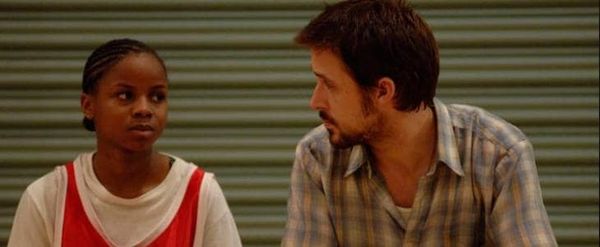Eye For Film >> Movies >> Half Nelson (2006) Film Review
Half Nelson
Reviewed by: Chris

Not at all mainstream, more like a portrait slice of inner city life, Half Nelson shows an almost inescapable situation with Ryan Gosling, playing high-school teacher Dan, who is warm and loving to his pupils, idealistic, inspiring, and also a crack-cocaine addict. He teaches history - heavily mixed with practical philosophy and a concentration on civil rights. It's an uncomfortable position for him to be in - and also for the pupils, one of whom discovers his habit and doesn't know what to do about it.
13-yr old Drey is a solid kid but knows she's a bit limited when it comes to available role models. Her brother is in prison. Frank, the drug dealer who put him there, has clarity of vision that the other characters lack but no sense of idealism. He feels responsible towards Drey and wants to protect her from Dan (who wants to protect her from Frank). Part of Drey's road to taking responsibility for her own life is to be pulled between these opposites without identifying with either of them. This polarity is mirrored in Dan's classroom obsession with dialectic. The drug-addicted teacher's sense of caring towards his pupil is also part of him learning to care about himself - as Drey probably suspects.

Half Nelson avoids just about every cliche. What little story development there is confounds any expectations of a Hollywood-style ending. The performances are lifelike, wholesome and unpatronising. Gosling's Oscar-nominated performance will attract those who usually avoid such art-house fare. Some will be blown away, some will want to go back to watching paint dry. Which is a shame, because although Half Nelson has something to say, it is more about acknowledging a heart and mind beneath the stereotypes of Brooklyn lowlife than about plot development.
Like the screenplay, cinematography paints a vision rather than meekly supporting a narrative. Dan's apartment is shot in murky, low-key lighting, contrasting his downbeat private life with the bright, sharp colours of his school. When working, he tries to fulfil his idealistic vision of what he should be, but occasionally loses it. During a scene in the gym, a deep focus shot unites him with the youngsters - both those active in the game he is coaching and those on the sidelines. But when the camera suddenly focuses in on Dan alone, leaving the others out of focus, we sense his isolation as he momentarily loses his grip. "The kids keep me focused," he says in a later scene to his friend Rachel.
The camera takes us in and out of Dan's life in an almost haphazard way, reminiscent of the photography in Larry Clark's Kids. There is no clear structure in his world - he goes with the flow and keeps up as best he can.
While Half Nelson is brilliantly observed, it is questionable whether the premise it offers is sufficient to sustain the whole movie. The slice-of-life attitude, reminiscent of Wayne Wang's Smoke (also shot in Brooklyn), is realistic, but it lacks the transcendent insights that it constantly aspires to draw from Hegelian Dialectic featuring so prominently in the script. The observations on the civil rights movement, while valid, are more schoolboy than schoolteacher level. As Dan's brain becomes too befuddled to tell a joke properly, his philosophical ramblings seem just that - rambling. Half Nelson is a beautiful foray by an independent filmmaker. It so nearly has something important to say instead of fumbling, like its protagonist, in the attempt.
Reviewed on: 28 Feb 2007



















